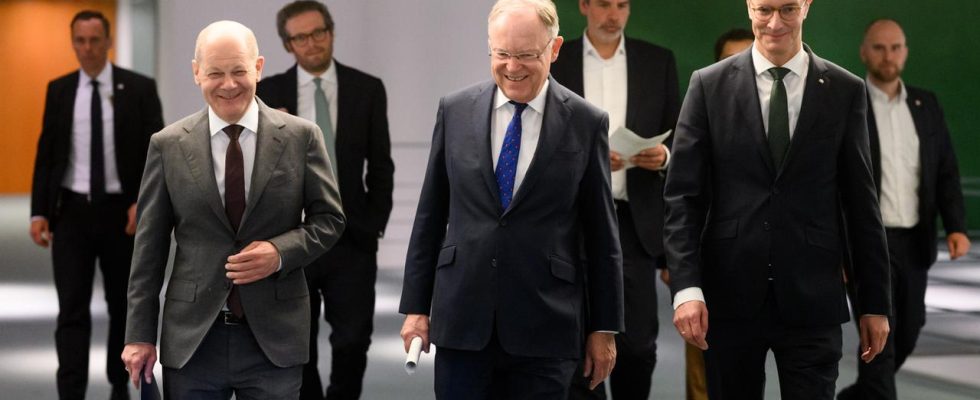analysis
The federal government is increasing its contribution to refugee costs this year by one billion euros – according to the result of the summit in Berlin. While the SPD was satisfied, countries led by the Union described this as “completely inadequate”.
The month-long struggle for more money for the municipalities and states to cope with the high number of people seeking protection did not end yesterday in the Chancellery. But even the prospect of an early solution is seen as a success.
One is visibly satisfied that evening: Chancellor Olaf Scholz. During the press conference following the migration summit, he says with a smile:
If you had asked me in the morning how things were going today, I would have said: exactly like that!
Because it seemed clear from the outset that the federal government would not participate in the demands of the federal states for a permanent larger financial contribution to the accommodation and care of the refugees. The federal states could not get more than the already speculated one-off payment of one billion euros from the federal government.
Because satisfied, libertine contrite
While it was a “good meeting” for Lower Saxony’s head of government Stephan Weil (SPD) and he even understands the restrictive attitude of the federal government, his CDU colleague, NRW state head Hendrik Wüst, seemed much more contrite.
Even before the heads of the federal states started their consultations with the Federal Chancellor, Wüst said about the prospect of a compromise with a one-off payment: “Partial results that would not be an entry into permanent, reliable additional federal funding at the expense of the federal states would not be a result .”
The Union-led state leaders from Bavaria, Saxony and Saxony-Anhalt criticize it even more severely: “The increase of one billion euros planned by the federal government is completely insufficient and does not do justice to the burden situation on site in any way,” they write in a protocol statement at the end of the decision paper .
Thuringia’s Prime Minister also notes that he continues to insist on a “breathing system” that is not aiming for lump sums, but per capita financing.
Working group to work out permanent solution
According to the Basic Law, the financing and care of refugees in the asylum procedure is a state matter. And the financial aid from the federal government is already high enough – around 15 billion euros, if you count the basic income for people who have fled Ukraine.
However, a working group should now be set up to develop further proposals by the next MPK in November, which can have a long-term effect in relieving the burden on municipalities and states. However, it can be doubted that this will inevitably involve more money.
Finance Minister Christian Lindner (FDP) has already made this abundantly clear several times. His parliamentary group leader Christian Dürr also said in the evening: “We’re not in a bazaar where more and more money is being haggled.”
turning point in the migration policy
There was only agreement between the heads of the federal states and the Federal Chancellor that they wanted to control the access of the refugees more closely. Already in the first four months of 2023, their number increased by 78.4 percent compared to the same period last year. Most come from Syria, but also from Afghanistan and Turkey.
paradigm shift in the migration policy
A sentence by the chancellor at the press conference in connection with the deportation of rejected asylum seekers to countries like Iraq or Syria drew attention: “There can be no decision, never there!” Instead of general deportations, Scholz is in favor of individual decisions.
And the decision paper also clearly shows that the federal and state governments are aiming for a paradigm shift in migration policy – also at the European level. With the strengthening of the border protection agency Frontex, the expansion of the list of safe countries of origin, in particular to Moldova and Georgia and to simplify deportations in general, there could also be discussions in the traffic light’s own ranks.
Just on the day of the summit, co-party leader Omid Nouripour, together with co-group leader Britta Haßelmann, published a ten-point plan for an orderly human rights-oriented asylum policy. It contains the sentence: “Increasing isolation cannot be the solution”. Not for the Greens, but possibly for the SPD and FDP. It would not be the first time that the traffic light parties are on a confrontational course.

